Summer Knights The A. Paul Knight Internship Program in Conservation, named in memory of a late Washington and Lee student, allows students to pursue their passion for environmental conservation.
A recent morning found Row Sterne ’25 and Connor Smith ’26 hiking an arduous path to crest the top of Lone Peak, the tallest mountain in Big Sky, Montana. The two hiked directly uphill for the first 4 miles along a thin ridgeline before reaching the central peak, making their way to the top along a narrow, rarely traveled path while holding onto a rope anchored into the mountain. All at once, Smith said, “we were at the highest peak in the surrounding range and were looking down at all the other mountains with clouds lower than we were. It was a view I won’t forget.”
Sterne and Smith are experiencing the magic of the American West this summer thanks to the A. Paul Knight Internship Program in Conservation. Undergraduates in the Knight program work for one of three organizations located within close proximity in eastern Idaho: the Henry’s Fork Foundation (HFF), the Nature Conservancy’s Flat Ranch or the Friends of Harriman State Park. Sterne and Smith spent their summer working for the Flat Ranch Preserve; Loren Hertzler ’27 is interning with the Friends of Harriman Ranch State Park; and Lily Greenwald ’25 is conducting research with the Henry’s Fork Foundation.
Knight Program Director Robert Humston, who is also the John Kyle Spencer Director for Environmental Studies and professor of biology, said the program offers opportunities to students from various academic disciplines and interests.
“This is a great experience for students who want to challenge themselves – to go outside of their comfort zone and experience that kind of landscape,” Humston said, “as well as students focused on a career in conservation and research.”
Debra Frein, environmental studies program coordinator, oversees applications for the program and said that over the years, many program alums have described the Knight program as “the best summer of their lives.”
Interns’ responsibilities include everything from mending fences and planting water lilies to conducting extensive scientific research projects. Greenwald, a double major in biology and global history from Houston, is spending her summer monitoring water quality and data loggers at Harriman State Park, including at sites under construction throughout the park. Greenwald’s work continues a project that started last year to monitor temperature in the Henry’s Fork, along what anglers call “The Ranch” in Harriman State Park. Greenwald travels to 17 sites weekly, downloading data, maintaining the sites and processing the data afterward for analysis.
“The Henry’s Fork Foundation’s models of partnering with both fishing and farming initiatives, focusing on hydrology and educating the greater area about the watershed and inhabitants are used as a guide for several other similar organizations around the West,” Greenwald said. “I feel very honored to be a part of it, if even for a summer.”
Rob Van Kirk, science and technology director for the Henry’s Fork Foundation, said the Knight program’s success is attributed to its ability to provide hands-on learning opportunities while fostering a sense of community among interns and program partners. In addition to their research, interns participate in activities ranging from river cleanups to education and outreach programming to donor relations.
“Students are getting a real taste of working on publication-quality science,” Van Kirk said, adding that the Knight Program has inspired other universities to create similar partnerships with the foundation over the years.
Sterne, an American history major on the pre-health track from Lynchburg, Virginia, who will be president of W&L’s Fly-Fishing Club in the fall, said his summer has influenced his mindset as he prepares for a career in the medical field.
“As a student with aspirations for medical school, I am seeing firsthand how preserving the natural world and the wildlife that depends on it has many benefits for overall human health,” Sterne said. “From better water quality to food with richer nutrients, conserving these lands is essential for us all.”
Smith, a double major in environmental economics and international politics from Asheville, North Carolina, agreed.
“I have most enjoyed getting to know the area surrounding Island Park, Idaho,” Smith said. “I’ve learned that Idaho has some of the most diverse geography anywhere in the United States – massive mountain peaks and beautiful views, ranging prairies full of native flowers, wide rivers teaming with trout and even massive sloping sand dunes that emerge out of nowhere. Being at the border between Idaho, Montana and Wyoming has allowed us to experience incredible hiking, camping and sightseeing. I’ve honed my skills as a fly fisherman on some of the nation’s most iconic rivers like the Madison, Gallatin, Yellowstone and Firehole. I’ve traveled to two iconic national parks, Yellowstone and Grand Teton, as well as countless state parks and forests.”
Hertzler, whose internship experience has included researching and writing an article about Harriman State Park, developing a trail condition monitoring system to evaluate the park’s trails and mapping the park’s canal system, said having such a variety of ecosystems within driving distance – from the Grand Teton’s glaciers to Yellowstone’s geothermal activity to the St. Anthony Sand Dunes – was an exciting opportunity, as was the chance to see diverse wildlife. She said the experience has affirmed her career passions.
“The Knight internship has allowed me to meet so many people who are passionate about environmental conservation,” said the Harrisonburg, Virginia, native. “Their dedication is inspiring and has made me confident in my decision to study education and natural sciences at W&L. This experience has helped me realize how much important work there is to be done at the intersection of those two subjects.”
Hertzler also said her summer has ignited her love of fly-fishing, helped in no small part by having Sterne as a teacher.
“Island Park is a renowned fly-fishing location, and Row spent a lot of time this summer teaching me how to fish,” Hertlzer said. “I didn’t have much luck — my best catch was a tiny cutthroat trout in Yellowstone’s Firehole River — but once I’m back at W&L, I feel like I have to join the fly-fishing club and try my luck in the rivers around Lexington!”
John McDaniel, professor emeritus of anthropology at W&L, first met Paul Knight ’85 during a lunch break on an archaeological dig on W&L’s campus, and the two men bonded over a mutual interest in fly fishing. During the summers of 1983-1985, Knight visited the McDaniel family at their summer home on the Henry’s Fork of the Snake River, in Idaho, one of the premier fly-fishing spots in the world. Then, in June 1985, Knight went missing during a backpacking trip at Yellowstone National Park. Two days later, rangers discovered he had suffered a fatal fall. He was 22 years old. Together, the Knight family and the McDaniels created the A. Paul Knight Internship Program at W&L. With generous contributions from Al Knight’s (Paul’s father) own funds, matches from his then employer, Merck and Co., and modest donations from others, the program placed its first intern in 1988. In the past 36 years, over 135 W&L undergraduate and law students have landed internships in environmental protection and conservation through the program, and many have gone on to work in those fields.
Al Knight ’51L passed away in 2019. McDaniel, who directed the Knight program until his retirement in 2004, now works as a fly-fishing guide for TroutHunter Lodge owned by Jon Stiehl and Rich Paini; both are Class of ’93 and former Knight interns who are part of what now comprises a significant community of W&L alumni and retirees in the area surrounding Snake River. McDaniel paid tribute to the sense of community and camaraderie surrounding the program during his recent remarks at a campus event in his honor marking the anniversary of W&L’s archaeology program.
“I have a dream of showing Paul Knight a video of the most skilled dry-fly anglers in the world having the time of their lives at the TroutHunter Bar and Grill,” McDaniel said, “which exists because of him and because of W&L.”
Chris Brand ’89, one of the program’s first interns and a former member of HFF’s board of directors, said Al Knight knew he had helped create a special opportunity for W&L students.
“Al could see the magic that had been created” by the program, Brand said.
Townsend Dotterer ’21, a recent Knight program alumna, went on to work for the National Outdoor Leadership School (NOLS) after graduation. The nonprofit teaches leadership and wilderness skills in New Zealand, and Dotterer credits the Knight program for preparing her to pursue her passion for international environmental conservation.
“I think the experience positively influenced my ability to go and live in a remote community and feel comfortable,” said Dotterer, who will join the Peace Corps in Nepal in January 2025 as an agriculture and food security volunteer, “because I know that I have the skills to make my own community from scratch.”
Students also benefit from being connected to a strong W&L presence in the surrounding community during their summer experience. In addition to Stiehl, Paini and the McDaniel family, the area is either home to or an annual summer vacation spot for several W&L alumni, many who were Knight interns themselves. Gary Franke, who retired as W&L’s head wrestling coach in 2011 and was involved in the program’s administration for many years during his time at W&L, owns a home on the Henry’s Fork and serves as a point of contact for students in the program, particularly with regard to the condo the Knight family purchased several years ago to assist with student housing needs related to the program.
Law students seeking to fund their summer experiences through the Knight program secure their own positions, then apply for a Knight stipend. Over the years, these students have worked for a diverse array of organizations, including the Natural Resources Defense Council, the Southern Environmental Law Center, the U.S. Department of Justice and the U.S. Environmental Protection Agency. This summer, Malia Devencenzi ’26L is working with the Native Hawaiian Legal Corporation in Honolulu, which provides legal aid to the local indigenous community by protecting traditional and customary rights, leases of land and other environmental concerns impacting the Native Hawaiian community. Devencenzi said she is grateful for the opportunity the Knight program has afforded her to give back to her community during her summer experience.
“Being Native Hawaiian myself, I knew coming to law school that I represented an underrepresented community of individuals who often do not get the chance to pursue higher education,” Devencenzi said. “The work I am doing this summer allows me to give back to my community and further open the gates for younger kanaka wahines who are interested in a career in law.” After graduation, Devencenzi hopes to continue to be a role model for Native Hawaiian youth and be involved in work supporting indigenous community rights, many of which intersect with issues related to conservation.
Brian Murchison, who serves as the Charles S. Rowe Professor of Law at W&L and has been involved with the Knight program for many years, said building a deep appreciation of and commitment to the natural world is precisely the legacy that Al Knight hoped for when establishing the program.
“This program was created by a man who, first of all, loved W&L and believed in W&L as an institution,” said Murchison. “The spirit of it was Al Knight wanting to memorialize his son, but also wanting to plant a little seed in favor of the environment in some of our undergrads and law students.”
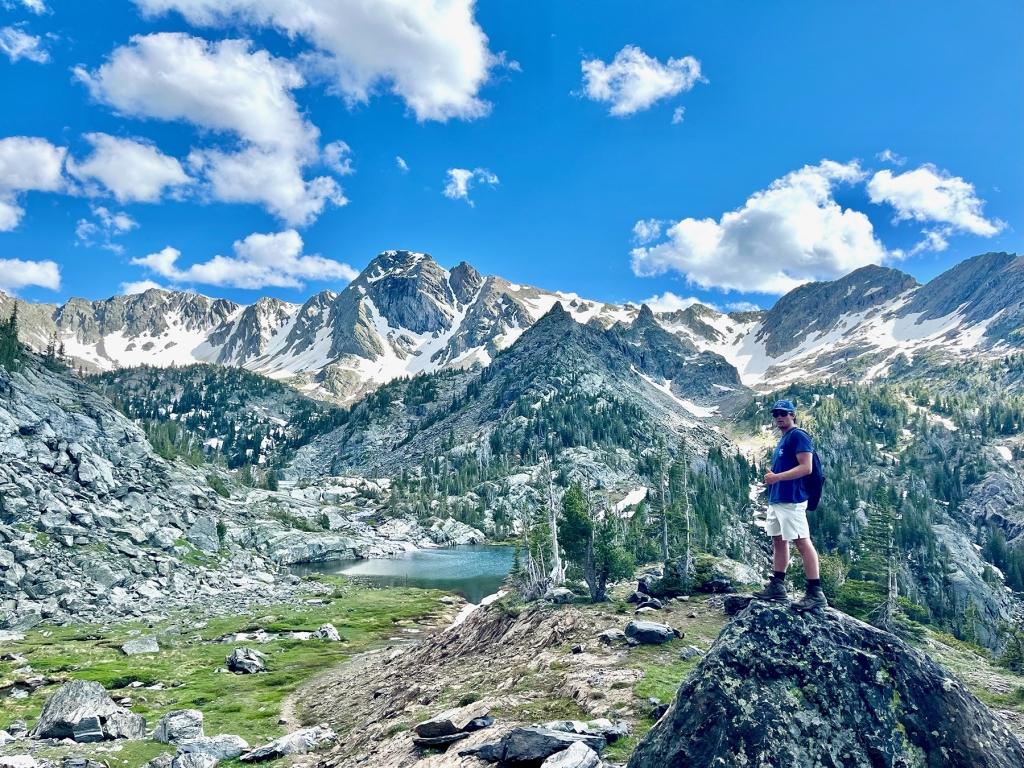 Connor Smith ’26 pauses to enjoy a scenic vista.
Connor Smith ’26 pauses to enjoy a scenic vista.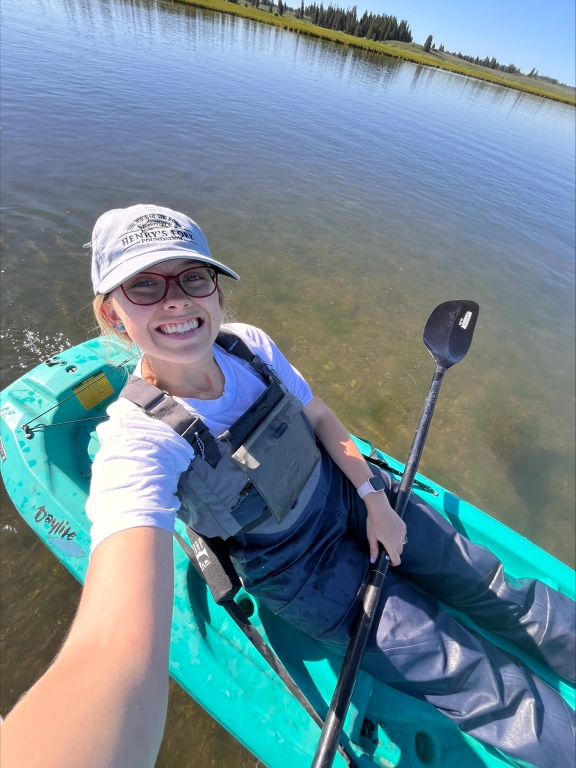 Lily Greenwald ’25 kayaks on the Snake River.
Lily Greenwald ’25 kayaks on the Snake River.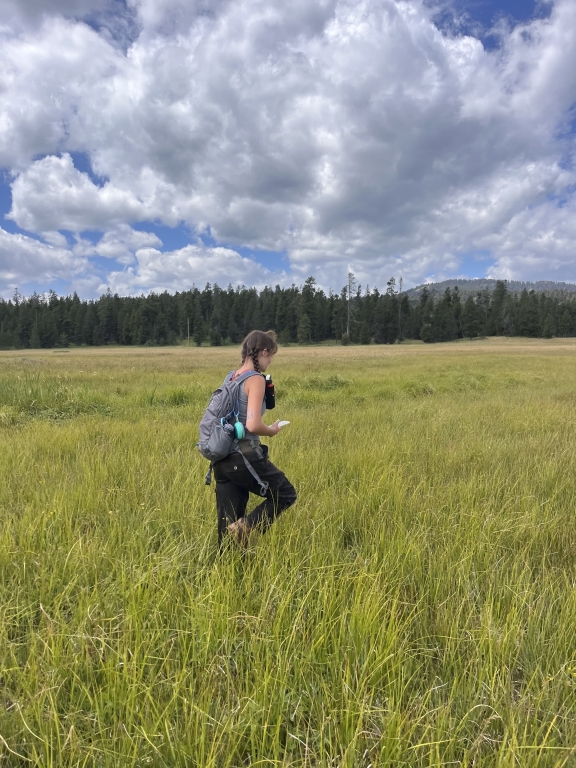 Loren Hertzler ’27 sets out on a hike.
Loren Hertzler ’27 sets out on a hike.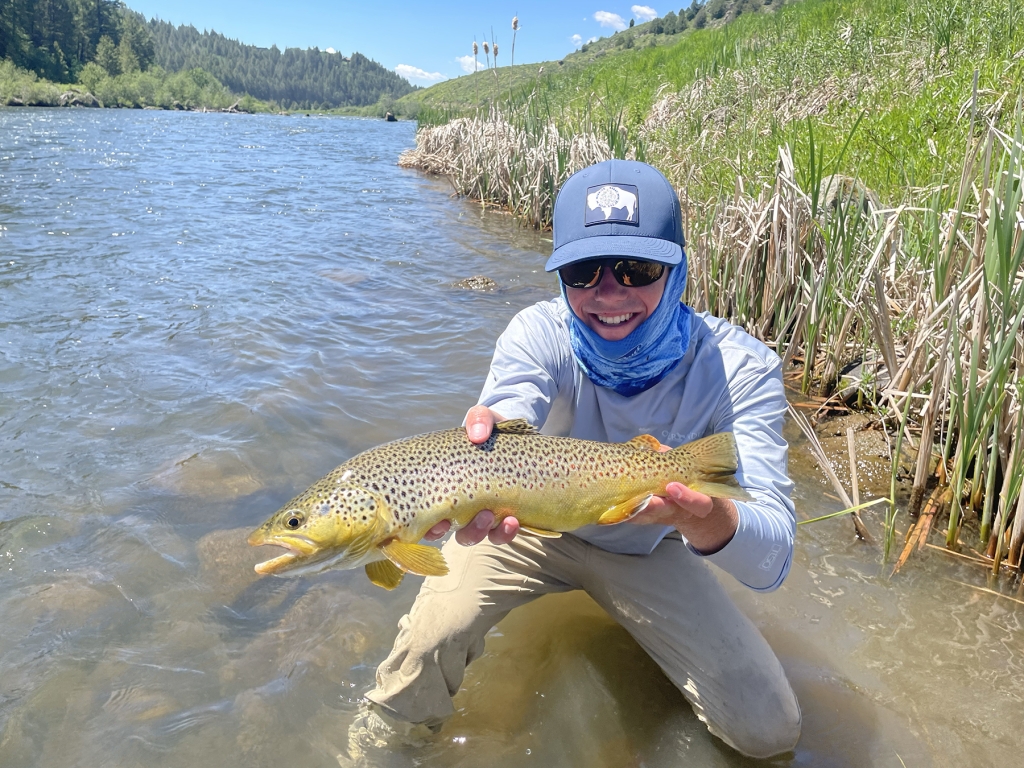 A good day’s fishing for Row Sterne ’25.
A good day’s fishing for Row Sterne ’25.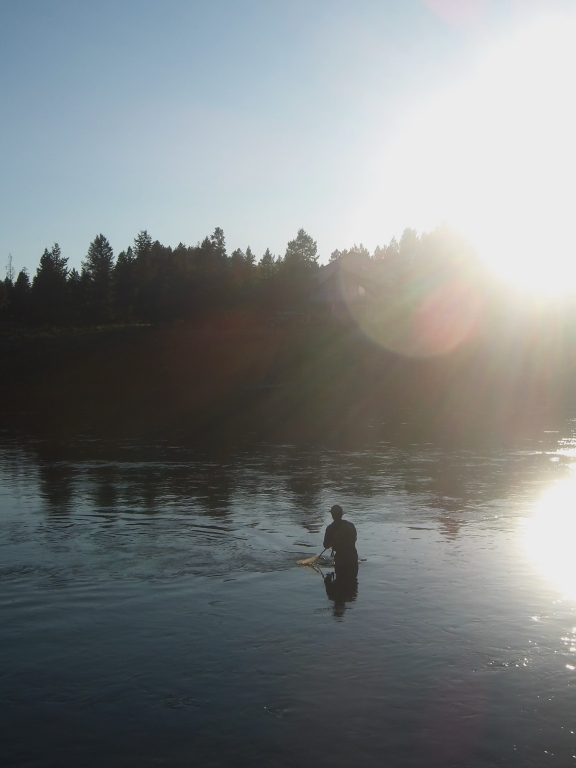 Fly-fishing at sunset on the Snake River.
Fly-fishing at sunset on the Snake River.
You must be logged in to post a comment.